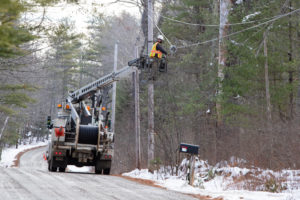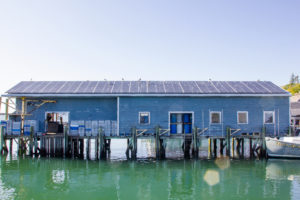The workforce shortage in Maine is nothing new, but it has become even more acute and highly visible as we emerge from the pandemic. In our work supporting Maine’s island and coastal communities, we have heard a lot about the workforce issues they are facing, and it is one of the top areas of concern for the partners and community members we work with. As the Island Institute went through its recent strategic framework planning process and developed the organization’s priorities for the next 10 years, it also became evident that there is a high need for clear education and career pathways for local residents.
In response, we are broadening our education work to better focus on this critical issue. Through our new Workforce Pathways team, we will help strengthen individual employment outcomes and improve community resilience in the face of change by supporting workforce development initiatives with a sharp focus on three key sectors: the digital economy, the creative economy, and climate resilience trades. We targeted these three areas because of the identified need and regional workforce opportunities that exist, as well as our long-term commitment and history of organizational experience and knowledge on these issues.
-
 The digital economy
The digital economy
Through our broadband work, we have spent years helping islands and other small, rural communities plan for and fund broadband solutions based on a proven community-driven broadband process. There is now an immediate need to increase the broadband infrastructure workforce in order to physically bring a high-speed internet connection to every corner of the state. Local workers are being sought out to do everything from splice fiber to manage multimillion-dollar broadband infrastructure projects. Significant internet installation and maintenance career pathways are emerging, and once connected to high-speed internet, there is almost limitless opportunity for established and new Mainers to become earners or increase their earnings in the digital economy.
-
 The creative economy
The creative economy
The Island Institute’s involvement in the creative economy is evident through our retail store and gallery, Archipelago, which showcases the work of over 300 Maine craftspeople and supports these small business owners through commissions from retail sales and opportunities for professional development, networking, and learning. This one-on-one support occurs through mentoring services as well as Archipelago’s annual Artists and Makers Conference, which offers artists and makers across the state the tools and resources to help them start or grow their arts-based businesses. Along Maine’s coast, the Arts, Recreation, and Tourism sector represents one of the top four industries, making it a key piece of our state’s economy and an important career option for adults as well as young people just entering the workforce.
-
 Climate resilience trades
Climate resilience trades
Maine’s islands and coastal residents have always been on the front line of environmental changes, making climate resilience a core part of the Island Institute’s work since our founding in 1983. We have supported energy efficiency and weatherization efforts, championed renewable energy projects, and provided technical support to communities as they pursue long-term solutions to threats such as sea level rise and warming ocean temperatures. Our new Workforce Pathways team will help residents train or retrain in climate resilience trades such as plumbing/HVAC, electricians, and solar photovoltaic installers. Developing local expertise in these trades will have the dual benefit of helping both individuals and communities become more resilient in the face of climate change.
In addition to the work mentioned above, our first big project as a team will be to host the Workforce Pathways Conference this October. The conference will build on the 30+ years of learning that the Island Teachers Conference helped catalyze and will include many of the same design principles, priorities, and content, including an emphasis on K-12 education, leadership development, and equity issues.
We are excited to bring together the education and workforce communities to build networks and connections and share ideas, information, and solutions to help our state address this critical need. We are confident that in doing so, we can reach our shared goals of improving individual livelihoods and strengthening Maine’s island and coastal communities.

